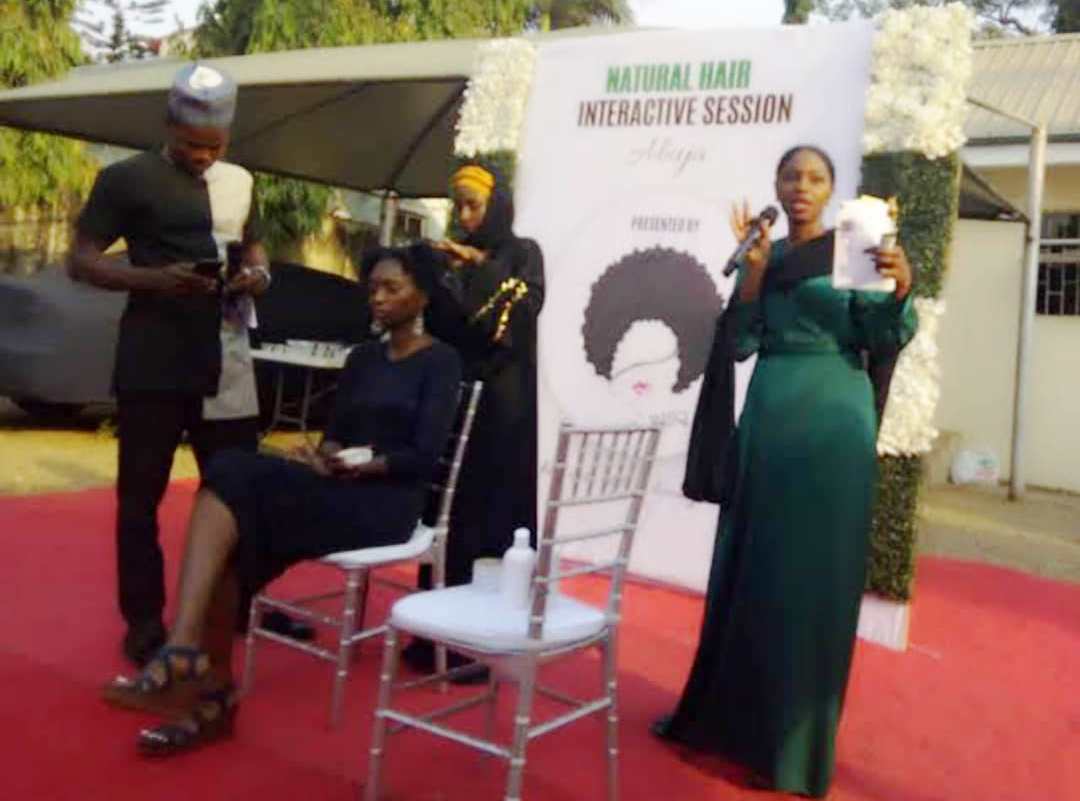Natural hair care: Emphasise health over growth, experts say
As more and more women are embracing growing their natural hair, experts have advised that they place emphasis on growing a healthy hair rather than stressing about length. That was the crux of the first annual Natural Hair Interactive Session Abuja (NHISA) organised by the founder of Natural hair and beauty blog JNSQ, Amal Auma […]

Speakers at the event demonstrating practical examples of some basic harmattan hair-care skills at the natural hair-care interactive session in Abuja.
As more and more women are embracing growing their natural hair, experts have advised that they place emphasis on growing a healthy hair rather than stressing about length.
That was the crux of the first annual Natural Hair Interactive Session Abuja (NHISA) organised by the founder of Natural hair and beauty blog JNSQ, Amal Auma Usman in collaboration with Zeezam Presents.
Amal noted that people tended to place so much importance to hair growth and not minding if the hair is healthy or not. She also noted that the essential hair care routine during the dry season must include hydration and moisturizing, adding that “we can’t talk about hydration and moisturizing without talking about hair porosity.”

While noting that women must know the type of hair they have as it will enable them better care for the hair, the hair specialist said there are three types of hair porosity – the high, medium and low porosity. “You really need to know that because it will determine how much water your hair will need. Low porosity will allow water pass through and hold it for a long time while highly porous hair, soaks in all the water but as quickly as it soaks in the water it also loses it and the moisture.”
“When water enters the hair, it enters the strands and swells them up. Naturally, the hair has a little bit of water in it, it has water droplets inside it, now when the eternal water enters the hair it swells it up, and it drains it and washes everything out of it. What happens when you do hot oil treatment is some of the oil stops that excess water from entering the strands. It’s called hydrophilia so you have a balanced amount of moisture,” she added.
She also emphasized that women must imbibe good hair practices, as it is the surest way of normalizing the hair and making it healthy and longer.

The CEO of Zeezam Presents, Khadija Garba, told the gathering that the dry and dusty harmattan season is no fun for natural hair growers which is why women must devote twice the time they normally do for their hair.
She debunked some hair care myths, including constant trimming of the hair for it to grow, stressing that “we do need trims once maybe in a year, and that is if you have damaged hair but trimming the hair every month, you actually are trimming off the growth you have. You don’t need to trim off so frequently. Ideally you should get a trim twice a year.”
She also faulted claims that heat damaged and split hair ends can be repaired with some products, stating that it is a temporary solution as no product will fix that damage.
Khadija also said while protective styles are guaranteed to help hair growth, by ensuring the hair is not been manipulated by constant combing, but keeping a braid for as long as six months damages the hair.
She also encouraged natural hair enthusiasts to always have a moisturizer, sulphate-free shampoo, leave in conditioner, deep conditioner, a sealant and a clarifying shampoo in their possession as they will always come in handy.
“You need a shampoo to clean out the hair, a leave in conditioner to moisturize the hair, sealant to keep that moisture longer, and a deep conditioner to add that extra bit of moisture in the hair after washing,” she explained.
“Avoid silicones in conditioners and sulphate in shampoos because what sulphate does is it stripe the hair of everything including the natural oil and moisture and make it dry and brittle. But you can choose to use it to wash the hair maybe once a month. Silicones make the hair dull, lifeless and with time makes it die but I will emphasize that it is important to know the type of hair you have and if it works for you stick to it,” she concluded.
The annual natural hair interactive session, which attracted women, young adults to the middle aged, aimed to address the challenges the women faced in taking care of their hair.
Amal explained that she came up with the initiative in order to educate and impart hair care knowledge in the participant and correcting the whole “African hair is difficult to manage” narrative.
She also noted that proceeds from the events and collaborating with other brands and organisations will be used to set up skill acquisition workshops and training people on hair care and beauty products, thereby creating job opportunities and empowering interested minds.
